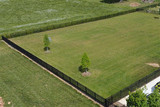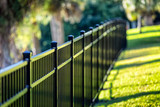Wrought Iron vs. Aluminum Fence Gates: Advantages and Disadvantages
When choosing the perfect gate for your property, two popular options often come to mind: wrought iron and aluminum. Both materials offer unique benefits and potential drawbacks, making the decision between the two a matter of personal preference, budget, and specific needs. In this blog post, we'll delve into the advantages and disadvantages of wrought iron and aluminum fence gates to help you make an informed choice.
Wrought Iron Fence Gates
Advantages:
- Strength and Durability:
- Long-lasting: Wrought iron is known for its incredible strength and durability, making it an excellent choice for security.
- Weather-resistant: It can withstand harsh weather conditions and heavy impacts without sustaining significant damage.
- Aesthetic Appeal:
- Classic elegance: Wrought iron gates offer a timeless, classic look that adds an element of sophistication and elegance to any property.
- Customization: They can be intricately designed and customized to fit various styles, adding a unique touch to your landscape.
- Security:
- Robust: Due to its strength, wrought iron provides excellent security, making it difficult for intruders to break through.
- Height and weight: Wrought iron gates are typically heavier and taller, which can deter potential intruders.
Disadvantages:
- Cost:
- Expensive: The initial cost of wrought iron gates can be high due to the material and the labor involved in crafting and installing them.
- Maintenance: Regular maintenance, such as painting and rust prevention, can add to the long-term costs.
- Maintenance:
- Rust-prone: Without proper maintenance, wrought iron can rust over time, especially in areas with high humidity or salty air.
- Regular upkeep: To keep them in pristine condition, wrought iron gates require regular painting, cleaning, and inspection.
- Weight:
- Heavy: The weight of wrought iron gates can make them difficult to install and operate, requiring sturdy hinges and support structures.
Aluminum Fence Gates
Advantages:
- Lightweight:
- Easy installation: Aluminum gates are much lighter than wrought iron, making them easier to install and operate.
- Less structural strain: The lightweight nature reduces the strain on hinges and support structures, leading to a longer lifespan for these components.
- Corrosion-resistant:
- No rust: Aluminum does not rust, making it an excellent choice for areas with high humidity, rain, or salty air.
- Low maintenance: It requires minimal upkeep compared to wrought iron, typically only needing occasional cleaning.
- Cost-effective:
- Affordable: Aluminum gates are generally more affordable than wrought iron, both in terms of initial purchase and installation.
- Energy-efficient: The production of aluminum is often less energy-intensive, which can be a consideration for eco-conscious consumers.
- Versatility:
- Variety of finishes: Aluminum gates can be coated in various finishes and colors, allowing for greater customization.
- Modern aesthetics: They offer a sleek, modern look that can complement contemporary architecture.
Disadvantages:
- Strength:
- Less robust: Aluminum is not as strong as wrought iron, making it less suitable for high-security needs.
- Potential for damage: It can be more susceptible to dents and bends from impacts
Conclusion
Choosing between wrought iron and aluminum fence gates depends on your priorities and specific needs. If security, strength, and classic aesthetics are your main concerns, wrought iron may be the ideal choice despite its higher cost and maintenance requirements. On the other hand, if you're looking for a lightweight, low-maintenance, and cost-effective option with a modern look, aluminum could be the better option.
Consider the environment, budget, and desired appearance when making your decision. Both materials have their unique advantages and can add significant value and appeal to your property.
Recent Posts
-
Why Winter Is the Best Time to Order Your Fence
When most people think about installing a new fence, spring and summer usually come to mind. But sav …Jan 31st 2026 -
Experience, Reputation, Customer Service
Here’s why buying from OnlineFenceStore.com is a strong choice for fencing products: Key Advantages …Aug 13th 2025 -
How to Order Fence from OnlineFenceStore.com: A Step-by-Step Guide
How to Order Fence from OnlineFenceStore.com: A Step-by-Step Guide Ordering a fence online has never …Jul 30th 2025







